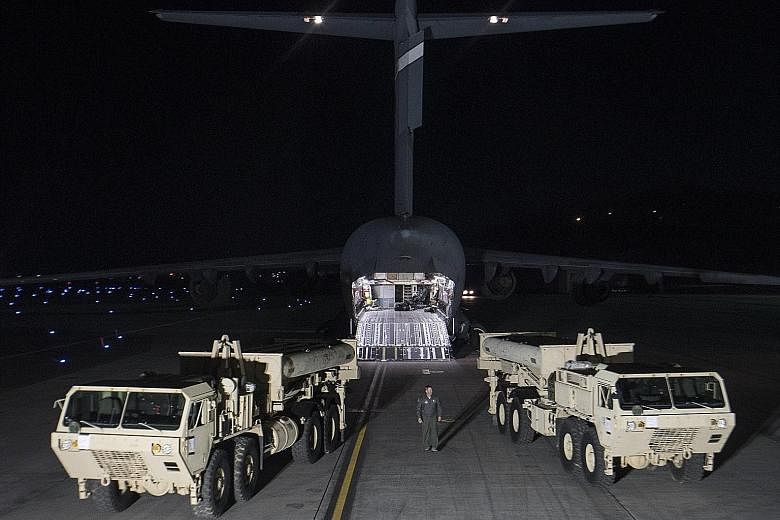South Korea and the United States have accelerated the controversial deployment of the Terminal High Altitude Area Defence (Thaad) anti-missile system by flying in two mobile launchers and other equipment, in a move that drew a strong rebuke from China, which views the system as a security threat.
The components landed on Monday night at an air base south of Seoul, just hours after North Korea launched four missiles in protest against ongoing military drills between the US and South Korea, and amid heightened tension between Seoul and Beijing.
Chinese Foreign Ministry spokesman Geng Shuang told a regular news briefing yesterday that Beijing is firmly opposed to the deployment of Thaad.
"We will resolutely take necessary measures to defend our own security. All the ensuing consequences shall be borne by the US and South Korea," he said. "We once again strongly urge the relevant parties to halt the deployment process instead of proceeding further in the wrong path."

Admiral Harry Harris of the US Pacific Command, announcing the first step in Thaad deployment, said North Korea's continued provocations, including Monday's missile launches, "only confirm the prudence of our alliance decision" to place a Thaad battery in the South.
Local reports said the deployment process started months earlier than expected and could be completed as early as next month, but the US Forces Korea (USFK) did not confirm the timeline for completion.
A spokesman told The Straits Times that it is "working to accelerate" the Thaad operation to counter North Korea's rising missile and nuclear threats, and that it is "on track" for the eight- to 10-month timeline set by USFK commander Vincent Brooks when he first announced the deployment last July.
South Korea's Defence Ministry also told The Straits Times that it "cannot confirm" when the deployment can be completed.
"We can only say, in this year," said a ministry spokesman.
Military experts say it may take months for Thaad to be fully deployed on its planned site in the eastern province of North Gyeongsang. It was only last week that the South Korean government inked a deal with Korean conglomerate Lotte Group to acquire land on its golf course for Thaad.
"To be fully operational, Thaad must be integrated into joint US-South Korea battlefield networks, operated by trained personnel under specific command structures and rules of engagement," said Dr Michael Raska from the S. Rajaratnam School of International Studies. "Therefore, while technical elements may be operational, the necessary organisational structures and supporting elements... may take more time."
Meanwhile, Seoul is under increasing pressure from Beijing to revoke the Thaad decision. Relations have never been so strained, with China reportedly orchestrating a series of retaliatory actions, from boycotting K-pop stars to closing down Lotte stores and blocking the sale of tour packages to South Korea.
Dr Lee Seong Hyon, a research fellow at the Sejong Institute think- tank, said the South Korean government "underestimated the Chinese threat" and is ill prepared to deal with the fallout. It was only yesterday that the government and ruling party agreed to actively consider lodging a complaint with the World Trade Organisation against China.
Dr Raska said Thaad deployment is necessary as it signals continued US commitment to the defence of South Korea and strengthens its capabilities against evolving missile threats from North Korea.
"China's opposition to Thaad is more about shaping South Korea's strategic choices... and in doing so, undermine the US-South Korea alliance. It's interesting to see that China is voicing more opposition to Thaad, rather than to increasing North Korean missile tests."
Correction note: This story has been edited to correct the spelling of the name of Dr Lee Seong Hyon. We apologise for the error.

